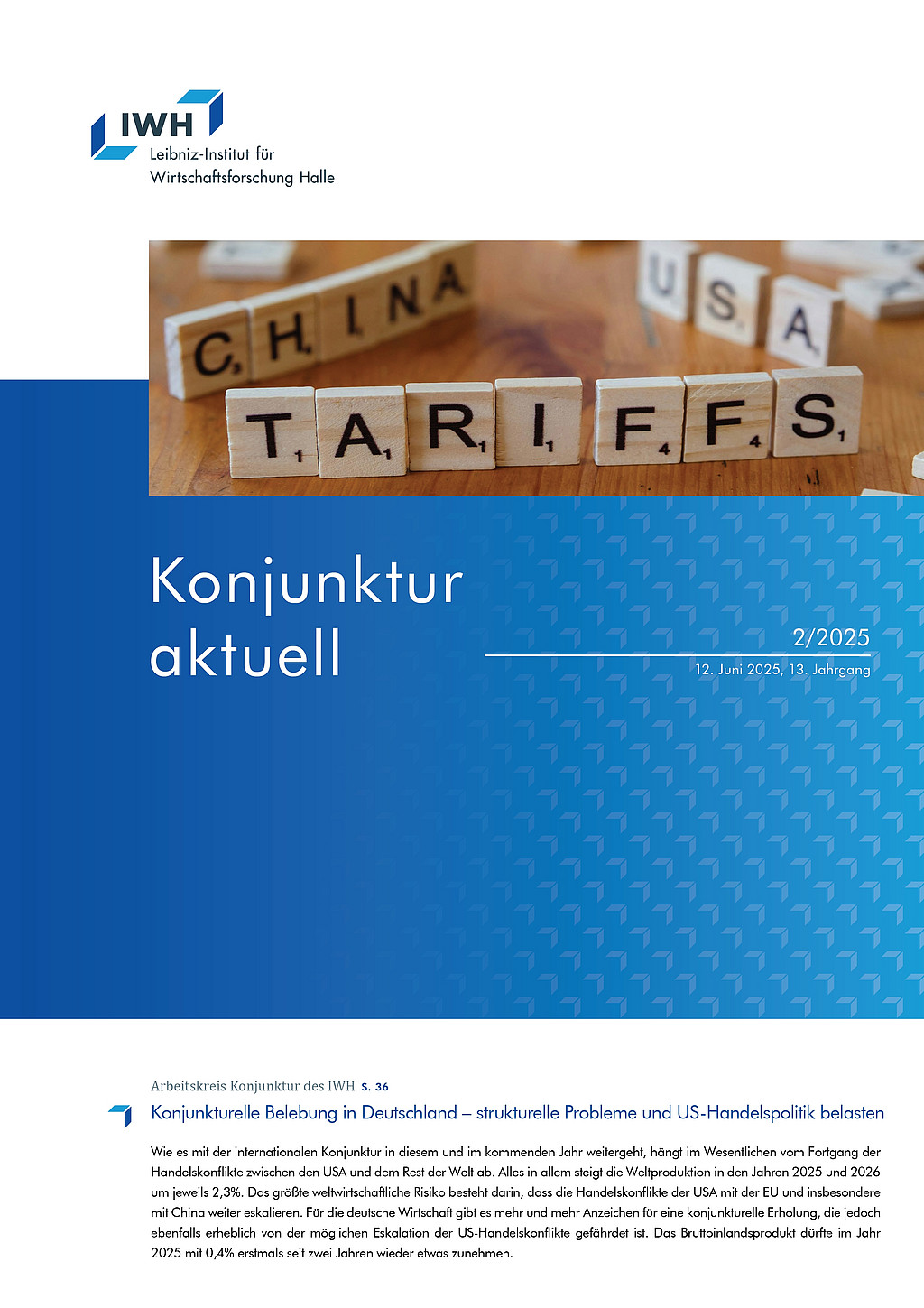Economic Forecasts
IWH regularly generates various economic forecasts for the global economy, the euro area, and the German economy for the ongoing and the following year. It also produces a separate annual forecast for the East German economy on the basis of sectoral developments in production and selected components of demand.
For this purpose it conducts regular firm surveys to collect data of economic activity.

Konjunktur aktuell: Konjunkturelle Belebung in Deutschland – strukturelle Probleme und US-Handelspolitik belasten
in: Konjunktur aktuell, No. 2, 2025
Abstract
<p>Wie es mit der internationalen Konjunktur in diesem und im kommenden Jahr weitergeht, hängt im Wesentlichen vom Fortgang der Handelskonflikte zwischen den USA und dem Rest der Welt ab. Alles in allem steigt die Weltproduktion in den Jahren 2025 und 2026 um jeweils 2,3%. Das größte weltwirtschaftliche Risiko besteht darin, dass die Handelskonflikte der USA mit der EU und insbesondere mit China weiter eskalieren. Für die deutsche Wirtschaft gibt es mehr und mehr Anzeichen für eine konjunkturelle Erholung, die jedoch ebenfalls erheblich von der möglichen Eskalation der US-Handelskonflikte gefährdet ist. Das Bruttoinlandsprodukt dürfte im Jahr 2025 mit 0,4% erstmals seit zwei Jahren wieder etwas zunehmen.</p>

Konjunktur aktuell: Zeitenwende für die deutsche Wirtschaft?
in: Konjunktur aktuell, No. 1, 2025
Abstract
<p>Die Ankündigungen und Entscheidungen der neuen US-Regierung um den Russland-Ukraine-Konflikt und die Zollpolitik haben weltweit zu hoher Unsicherheit geführt. Im Euroraum bleibt die Konjunktur schwach. Auch die deutsche Konjunktur ist weiter im Abschwung. Das Bruttoinlandsprodukt dürfte im Jahr 2025 um 0,1% und im Jahr darauf um 1,3% zunehmen.</p>

Konjunktur aktuell: Frostige Aussichten für die deutsche Wirtschaft
in: Konjunktur aktuell, No. 4, 2024
Abstract
<p>Zur Jahreswende dürfte die weltweite Produktion weiterhin in etwa so schnell wie in der Dekade vor der Pandemie expandieren. Die Konjunktur im Euroraum ist nur verhalten, und die Stagnation der deutschen Wirtschaft setzt sich fort. Die Industrie verliert an internationaler Wettbewerbsfähigkeit. Unternehmen und Verbraucher halten sich aufgrund unklarer wirtschaftspolitischer Aussichten mit ihren Ausgaben zurück. Das Bruttoinlandsprodukt dürfte im Jahr 2024 um 0,2% sinken und im Jahr 2025 um 0,4% expandieren.</p>

Mittelfristige Projektion der gesamtwirtschaftlichen Entwicklung und Szenarien für die Erreichung der gesetzlichen Emissionsziele
in: Konjunktur aktuell, No. 4, 2024
Abstract
<p>Das Produktionspotenzial der deutschen Wirtschaft wächst mittelfristig (2023 bis 2029) mit einer jahresdurchschnittlichen Rate von 0,3% und damit deutlich schwächer als in den Jahren zuvor. Dies ist auf eine ungünstigere Entwicklung aller drei Faktoren (Arbeitsvolumen, Kapitalstock, totale Faktorproduktivität) zurückzuführen. Das potenzielle Wachstum wird insbesondere durch den Rückgang der durchschnittlichen Arbeitszeit gedämpft.</p>

Moderate economic growth in the world – German economy continues to stagnate
in: Konjunktur aktuell, No. 3, 2024
Abstract
<p>The recent moderate pace of the global economy will continue for the time being. In Europe, the economy is likely to pick up slightly from the winter half-year 2024/2025. In Germany, the sluggish export business in particular is providing a lack of economic impetus. However, private consumption will contribute to a slight economic recovery in the winter half-year. Gross domestic product is likely to stagnate in 2024 and grow by 1.0% in 2025.</p>



